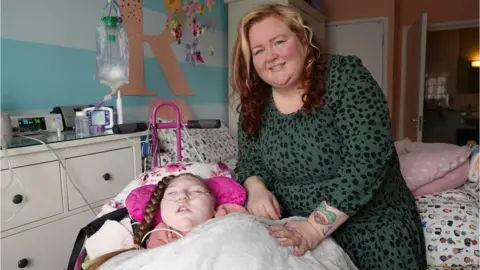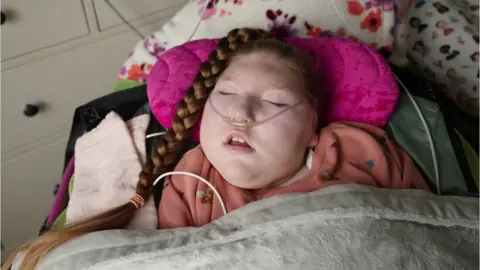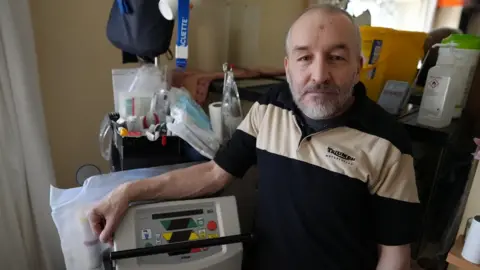Cost of living: 'It feels like I'm being priced out of existence'
 BBC
BBCSitting in her specially adapted bedroom, 15-year-old Ruby Walsh breathes slowly through a nebuliser, which covers her nose and mouth.
The teenager, who is deaf and blind, has cerebral palsy, and this is just one of the pieces of medical equipment needed to keep her alive.
But her need for a nebuliser, along with a ventilator and an oxygen concentrator, is pushing up her family's energy bills at a time when money is already tight.
The cost of living squeeze means the family, who live in Basildon, Essex, have already seen their energy bills rise from £175 to £225 a month. They are reimbursed for the oxygen concentrator, but everything else comes out of the household budget.
Energy bills are set to rise even further after the energy cap rises on 1 April.
'We just want a simple life'
Ruby is terminally ill and her mum, Charlotte Huzzey, wants to ensure they can still enjoy time together.
"She shouldn't be unable to go out because we're having to pay for a machine to be on," Charlotte says. "That's not something a 15-year-old girl that's probably not going to be here for too much longer should be dealing with.
"We just want a simple life, so that we can enjoy Ruby and she can enjoy the outside world."
In 2019 a survey conducted by the charity Scope suggested one in three disabled people found their condition had a significant impact on their energy bills, contributing towards an overall £583 in extra costs each month.
That was before typical energy prices rose in October 2021 by 12%, with a further 54% increase set for next month. There is no targeted support to help people with disabilities and long-term health conditions cope with higher energy needs.
The government says financial support is available to disabled people and their carers. It is urging people to check whether they are receiving all of the benefits they are entitled to, alongside wider support such as help with transport, broadband or prescription costs.

Dialysis patient Phoenix Halliwell says he feels like he is being "priced out of existence".
The 46-year-old father from Coventry, in the West Midlands, uses a kidney dialysis machine for nine hours a night, five nights a week, to help him stay alive.
His family switched off their heating at the end of January to make ends meet. Despite this drastic measure, their energy bills have increased by 50% since July, and are set to rise by a third next month.
'A humanitarian crisis'
Phoenix is reimbursed for about half of his electricity bill, but estimates this will fall to a third if the prices go up again in October.
He is now considering going in to hospital for dialysis to further cut costs. But a single nine-hour dialysis session at home can work out the same as a week's treatment at the hospital (three separate three-hour sessions), and he fears the move could damage his physical and mental health.
"We've done everything we can to cut back at home on outgoings and use of energy." he says. "As a disabled person with a long-term condition, it feels like I am being priced out of existence. Everybody's fed up with being cold. Ensuring our daughter is safe and warm and fed is our top priority."

Home dialysis already costs people between £590 and £1,450 per year due to increased water and electricity usage, Kidney Care UK says.
The charity says about half of all dialysis patients are financially deprived, and demand for its £300 hardship fund has increased by 47% over the past 12 months.
"We are hearing from increasing numbers of dialysis patients that they are having to choose between dialysing and putting food on the table," says policy director Fiona Loud.
"We are expecting a significant increase in requests for hardship support this year. Many patients have raised concerns about how they will be able to cope."
Some people with a disability qualify for Personal Independence Payments (PIP), or its predecessor the Disability Living Allowance.
But campaigners argue it is insufficient to cover the soaring energy costs that many disabled people are currently facing.
A petition has been launched urging the government to provide a grant to people with long-term health needs so they can afford to run their equipment.
Dan White, from Disability Rights UK, is calling for energy prices to be capped for disabled people, and planned benefit increases to be doubled to 6% in April.
"People are having to use their benefits, which were put aside to pay for their social care and for their independence, into paying for food and bills, and it is still not enough.
"People are turning off power, and parents and carers are turning off essential equipment for their children's health to save money," Mr White added. "This is a humanitarian crisis and it's only going to get worse."
The Government says it is taking "decisive action" to help more than 27 million households with rising energy costs, with a £200 reduction on bills this autumn and a £150 reduction in Council Tax bills.
It says the energy price cap will insulate millions of customers from volatile global gas prices.
